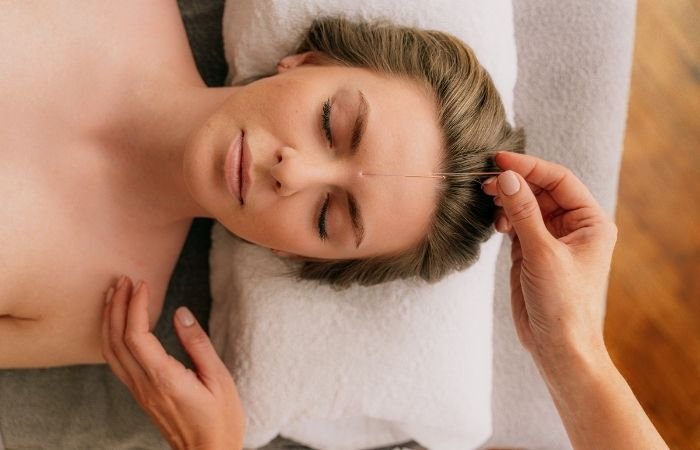Exploring the Benefits of Acupuncture: An Ancient Therapy for Modern Health Issues

In today’s fast-paced world, many individuals are turning to alternative therapies to complement conventional medicine, and one such therapy gaining popularity is acupuncture. With roots in ancient Chinese medicine, acupuncture is a time-tested treatment that has helped millions of people manage a wide range of health issues. From stress relief to chronic pain management, acupuncture offers a natural approach to wellness.
Do you ever feel overwhelmed by stress or persistent pain? Have you considered acupuncture as a potential solution? Acupuncture has become an increasingly sought-after treatment due to its ability to promote healing, improve well-being, and treat various health conditions. In this article, we’ll dive into the benefits of acupuncture, how it works, and what health issues it can help with.
1. What Is Acupuncture?
Acupuncture is a form of traditional Chinese medicine that involves inserting fine needles into specific points on the body to stimulate energy flow. This energy, known as “Qi” (pronounced “chee”), is believed to flow through channels in the body called meridians. The goal of acupuncture is to balance the flow of Qi and restore harmony within the body, leading to improved health.
- How It Works: The acupuncture needles are inserted into specific points based on the condition being treated. The insertion of these needles stimulates the nervous system, prompting the body’s healing responses.
- Pain Relief and Healing: Acupuncture is believed to release endorphins, the body’s natural painkillers, and improve blood circulation, which helps promote healing in the affected area.
- Non-Invasive: Unlike many medical treatments, acupuncture is non-invasive and generally considered to have fewer side effects.
2. How Does Acupuncture Benefit Your Health?
Acupuncture is known for its ability to treat a wide range of physical and mental health issues. Here are some of the key benefits:
- Pain Management:
One of the most common uses of acupuncture is pain management. Acupuncture is often used to alleviate chronic pain, such as back pain, arthritis, headaches, and migraines. Research shows that acupuncture can help reduce pain by stimulating the body’s natural pain-relieving systems. - Stress Reduction and Mental Well-being:
Acupuncture can help reduce stress and anxiety by promoting relaxation and improving emotional well-being. By stimulating certain points on the body, acupuncture can activate the parasympathetic nervous system, which helps the body relax and reduce stress levels.
Improved Sleep Quality:
Acupuncture has been found to improve sleep quality and reduce insomnia. By balancing the body’s energy flow, acupuncture can help regulate the nervous system, allowing for a more restful night’s sleep. It can be particularly helpful for those who struggle with sleep due to anxiety or pain. - Digestive Health:
Acupuncture can also support digestive health by improving the function of the digestive system. It is used to treat conditions like irritable bowel syndrome (IBS), bloating, indigestion, and constipation. By stimulating acupuncture points related to digestion, it helps balance the digestive process. - Boosting the Immune System:
Acupuncture has been shown to strengthen the immune system, making it easier for the body to fight off infections. By improving circulation and stimulating the body’s natural defenses, acupuncture can help you stay healthier and recover more quickly from illness. - Hormonal Balance:
Acupuncture can support hormonal balance, making it useful for conditions like menstrual irregularities, menopause symptoms, and fertility issues. By regulating the flow of energy in the body, acupuncture can help restore balance to the reproductive system.
3. What Health Conditions Can Acupuncture Help Treat?
Acupuncture can be effective in treating a variety of health conditions, including both physical and emotional issues. Some of the most common conditions that acupuncture can help with include:
- Chronic Pain:
Acupuncture is highly effective in managing chronic pain conditions such as back pain, neck pain, and arthritis. Studies suggest that acupuncture can significantly reduce pain levels and improve mobility in individuals with these conditions. - Migraines and Tension Headaches:
Acupuncture has been shown to reduce the frequency and severity of migraines and tension headaches. By stimulating specific acupuncture points, it can help relieve the pain associated with these conditions. - Stress and Anxiety:
Acupuncture has been widely recognized for its ability to reduce stress and anxiety. It helps regulate the body’s stress response and promotes a sense of calm and relaxation. - Insomnia:
People suffering from insomnia may find relief through acupuncture, as it can help regulate sleep patterns and improve the quality of sleep. It is often used as a natural treatment for those who have difficulty falling or staying asleep. - Digestive Disorders:
Acupuncture can be a useful treatment for digestive issues like IBS, constipation, and bloating. By stimulating certain points, acupuncture helps improve digestion and relieve discomfort. - Infertility and Menstrual Issues:
For women experiencing menstrual irregularities or fertility challenges, acupuncture can help regulate hormones and increase blood flow to the reproductive organs. It’s often used alongside other treatments to support fertility.
4. Is Acupuncture Safe?
Acupuncture is generally considered safe when performed by a licensed and trained practitioner. However, like any form of therapy, it’s important to consult with a healthcare provider before starting acupuncture, especially if you have a medical condition or are pregnant.
- Side Effects: Most people experience little to no side effects from acupuncture. Some may experience minor bruising or soreness at the insertion points, but these are typically temporary and subside shortly after the session.
- Precautions: If you’re considering acupuncture, make sure you choose a licensed acupuncturist who is trained in the practice. They will be able to ensure that the treatment is safe and effective for your specific needs.
5. How Many Sessions Are Needed?
The number of acupuncture sessions required can vary depending on the individual and the condition being treated. Some people experience relief after just one session, while others may require several treatments to see significant improvements.
- Acute Conditions: For acute conditions like headaches or injuries, fewer sessions may be needed to achieve relief.
- Chronic Conditions: For chronic conditions, such as back pain or stress management, a longer treatment plan may be necessary. Many acupuncturists recommend a series of treatments for optimal results.
6. What to Expect During an Acupuncture Session?
If you’ve never had acupuncture before, you may be curious about what to expect during a session. Here’s what typically happens:
- Consultation: The acupuncturist will begin by discussing your health history, symptoms, and any concerns you have. This helps them determine the most appropriate treatment plan.
- Needling Process: During the session, the acupuncturist will insert thin needles into specific acupuncture points on your body. Most people find the needles to be virtually painless, with some feeling a slight tingling or sensation of pressure.
- Relaxation: You’ll be asked to relax while the needles remain in place, usually for about 20-30 minutes. During this time, the acupuncturist may leave the room, allowing you to fully relax and experience the benefits of the treatment.
- Post-Treatment: After the needles are removed, you may feel a sense of relaxation or energy, depending on the condition being treated.
Conclusion: Embrace the Power of Acupuncture
Acupuncture is a powerful therapy with a long history of helping people achieve better health and well-being. Did you know that acupuncture has been practiced for over 2,000 years and continues to be a valuable part of traditional Chinese medicine today?
Whether you’re looking for pain relief, stress reduction, or support for chronic conditions, acupuncture offers a natural and effective solution. It’s a safe, non-invasive way to promote healing and restore balance to your body.
As interest in holistic therapies grows, acupuncture is becoming a go-to treatment for many seeking to improve their health. If you’re considering acupuncture, consult with a licensed acupuncturist to determine the best treatment plan for your needs and experience the numerous benefits this ancient therapy can offer.




